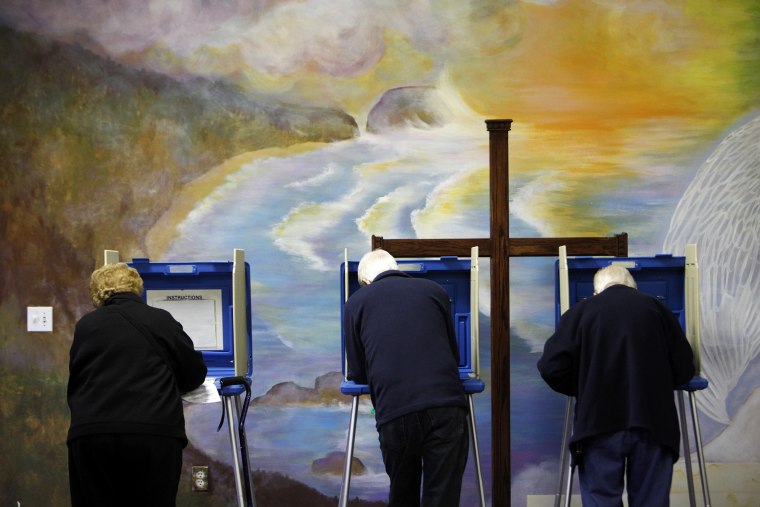We’re still more than five months from midterm elections, but already Republican voting restrictions are causing chaos in states across the South, and in some cases, blocking access to the ballot. The slew of problems, even in a recent series of low-profile elections, is raising fears that large numbers of voters could be disenfranchised this fall if the laws aren't blocked before then.
Because two of the states involved, Arkansas and North Carolina, are hosting tight Senate races this fall, it’s possible that the laws could even be decisive in helping Republicans gain total control of Congress.
“The problems we’re seeing in places like Arkansas and North Carolina are only going to worsen in higher-turnout elections in November, when hundreds of thousands more voters will arrive at the polls,” said Dale Ho, director of the ACLU’s Voting Rights Project. “They demonstrate exactly why we’ve filed motions to put these laws on hold until they’ve been thoroughly vetted by the courts.”
"The problems we’re seeing in Arkansas and North Carolina are only going to worsen when hundreds of thousands more voters arrive at the polls."'
This week, Arkansas’s voter ID law has been in the spotlight. During Tuesday’s primary, some poll workers reportedly quizzed voters on their personal information even after being shown ID, and used bar-code scanning machines to verify IDs -- both of which go way beyond what the law allows. Even worse, under the law, absentee ballots submitted without ID aren’t counted. In one county, that’s led to better than 8 in 10 absentee voters being disenfranchised -- without even being notified. In response to the problems, the state has largely shrugged its shoulders.
Then there’s North Carolina, which last year passed the nation’s most restrictive voting measure. The law’s ID requirement won’t be in effect until 2016. But groups monitoring the polls during the state’s primaries earlier month still reported plenty of cause for concern. They said the law’s provision that disqualifies votes cast in the wrong precinct caused major confusion. And they described the state’s campaign to inform voters about the coming ID requirement as haphazard and inconsistent. That leaves aside the law’s cuts to early voting and its elimination of same-day voter registration -- both of which could have a major impact in a high turnout race.
The problems in Arkansas and North Carolina could have national implications if they show up again in November, because both states are hosting Senate races that figure to be among the closest in the country, with control of the chamber hanging in the balance. Democratic Sens. Mark Pryor of Arkansas and Kay Hagan of North Carolina are facing strong Republican challengers, and their fates could well hinge on African-American turnout. It’s black voters, of course, who are most likely to be disenfranchised by the laws.
Texas -- where a 92-year-old woman who lacks a birth certificate recently was able to get the ID she needed to vote only after generating media outrage -- is another cause for concern.
In the Lone Star State's off-year elections last November, there were plenty of signs of potential trouble -- even though turnout reached only 6%. A former speaker of the U.S. House struggled to get the ID he needed to vote. Meanwhile, a massive number of Texans -- disproportionately women, it appears -- had to sign affidavits before voting, because of slight mismatches between the name on their ID and that on the rolls. (One Dallas woman with that problem told msnbc she was wrongly forced to cast a provisional ballot, and it’s not known how many others that happened to.) This fall, when Wendy Davis’s campaign for governor is expected to draw a large number of new voters —many of them Hispanic—to the polls, having to sign affidavits could cause long delays, voting rights advocates fear. And of course that leaves aside the fact that nearly 800,000 Texans, by the state's own count, lack ID.
Disenfranchisement isn't a done deal. Voting rights lawyers are urgently working to get these laws blocked before the midterms. And they’re likely to use the recent problems to help make their cases in court.
Holly Dickson, a lawyer with the Arkansas chapter of the ACLU, said her group would likely include evidence from the primary in its ongoing legal effort to have the ID law struck down under the state constitution. It’s already twice been declared unconstitutional by a state judge, but those rulings are currently on hold.
The North Carolina and Texas laws are both being challenged by the U.S. Justice Department and voting rights groups, who are busy compiling evidence that the laws discriminate against blacks and Hispanics. In North Carolina, where a trial isn’t scheduled until 2015, the plaintiffs recently asked for an injunction to put the law on hold for November. And they’ll likely make a similar request if needed in Texas, with the trial set to take place in September.
